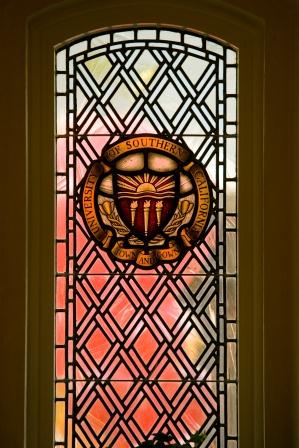“Til Our Next Disagreement Do Us Part – Working Effectively with Friends or Frenemies.”
A panel on finding collaborators and making your academic collaborations work.
Date: Tuesday, November 6
Time: 11:30am – 1:00pm
Location: TCC 227
Please rsvp at: www.usc.edu/esvp (code: idiploma2). Lunch will be served.
Marientina Gotsis, MFA
USC School of Cinematic Arts – Interactive Media Division
Director/Co-founder, Creative Media & Behavioral Health Center
Marientina Gotsis is a research assistant professor in the USC School of Cinematic Arts and the director of the Creative Media & Behavioral Health Center (CM&BHC), an organized research unit between the School of Cinematic Arts and the Keck School of Medicine. CM&BHC works to increase public awareness of critical issues in mental health and behavioral science and to provide hands-on creativity-based educational opportunities for health researchers and practitioners. Gotsis, who comes from a broad background in arts, design and engineering with special interest in medicine, public health and health behavior, leads a team that has developed several innovative applications using games for health behavior change. Gotsis has extensive experience collaborating across disciplines; she is project director and co-principal investigator on Wellness Partners, an intergenerational pilot project for health games research funded by the Robert Wood Johnson Foundation through a collaboration with the Keck School of Medicine, the School of Social Work and the USC Center for Work & Family Life. Additional projects include: a collaboration with UCLA’s Center for Autism Research and Treatment (CART) and University of Washington’s Autism Center to evaluate a novel game controller and game for social skills training in children; an NIH-funded pilot at the Keck School of Medicine to develop stereoscopic transmedia to communicate basic concepts about vision to children; and a concept prototyping project for games and interactives to explain complex issues about the science of early childhood development to policymakers and the public in collaboration with the Center on the Developing Child at Harvard University and USC’s Zilkha Neurogenetic Institute.
Manuel Pastor
USC Dornsife College of Letters, Arts and Sciences – Sociology and American Studies & Ethnicity
Director, Program for Environmental and Regional Equity
Co-director, Center for the Study of Immigrant Integration
Dr. Manuel Pastor is Professor of Sociology and American Studies and Ethnicity in Dornsife and serves as the director of the Program for Environmental and Regional Equity, housed in the USC Center for Sustainable Cities, and as co-director of the Center for the Study of Immigrant Integration. Pastor’s research has generally focused on issues of the economic, environmental and social conditions facing low-income urban communities – and the social movements seeking to change those realities. His most recent book, Just Growth: Inclusion and Prosperity in America’s Metropolitan Regions, co-authored with Chris Benner (Routledge 2012), argues that growth and equity can and should be linked, offering a new path for a U.S. economy seeking to recover from economic crisis and distributional distress. In honor of his work, the Liberty Hill Foundation presented Pastor with the 2012 Wally Marks Changemaker Award, which honors an outstanding individual whose work in the community illustrates Martin Luther King Jr.’s insight that while “the arc of history is long, it bends toward justice.” Dr. Pastor has received fellowships from the Danforth, Guggenheim, and Kellogg foundations and grants from the Irvine Foundation, the Rockefeller Foundation, the Ford Foundation, the National Science Foundation, the Hewlett Foundation, the MacArthur Foundation, the California Environmental Protection Agency, the W.T. Grant Foundation, the California Endowment, the California Air Resources Board, and many others.
Terence Sanger
Viterbi School of Engineering – Biomedical Engineering
Keck School of Medicine – Neurology
Director, USC Pediatric Movement Disorders Center
Academic Director, HTE@USC
As the academic director of USC’s HTE@USC, an interdisciplinary educational program for medical and engineering students, Dr. Terry Sanger brings his background in engineering and medicine to the challenge of fostering effective collaborations between the two fields. Dr. Sanger holds appointments in Biomedical Engineering, Neurology, and Biokinesiology, and he is also the director of the Pediatric Movement Disorders Clinic at Childrens Hospital of Los Angeles. His laboratory research focuses on understanding the origins of pediatric movement disorders from both a biological and a computational perspective. Dr. Sanger coordinates the Childhood Motor Study Group (CMSG) and the NIH Taskforce on Childhood Motor Disorders, and he is principal investigator on several research studies at USC. At CHLA, Dr. Sanger works with specialists from Rehabilitation, Surgery, Neurosurgery and other specialty areas. His training includes background in Child Neurology, Electrical Engineering, Signal Processing, Control Theory, Machine Learning, and Computational Neuroscience.
Melora Sundt
Rossier School of Education – Clinical Education
Vice Dean for Academic Programs, Rossier School of Education
Dr. Melora Sundt is Vice Dean for Academic Programs and Professor of Clinical Education at Rossier. In this capacity, she oversees the degree programs, admissions and student services, and through the Associate Dean supervises program directors. Dr. Sundt specializes in the areas of online learning and instruction, creativity and innovation in higher education, diversity issues, and violence prevention on college campuses. Dr. Sundt chaired the design teams that created the MAT@USC program and the Global Executive EdD. Dr. Sundt also teaches in the master’s, MAT, Global Executive EdD and on-campus EdD programs. She recently concluded a 10 year, US Dept of Justice-funded campus violence prevention program, and has conducted evaluations of nationally and internationally based educational partnerships and programs for federal agencies and foundations such as the Corporation for National Service, USAID, FIPSE, NEH and the Kauffman Foundation. Her other work has addressed sexual harassment in the academy, gender bias in the middle school classroom, sexual assault on campus, hate speech codes, and academic integrity.





